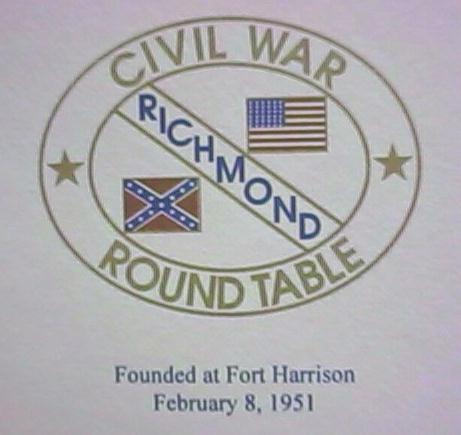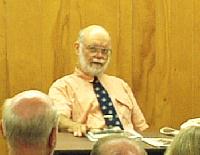


July 2001
Sam Craghead, President Art & Carol Bergeron, Editors 4361F Lakefield Mews 3901 Paces Ferry Road Richmond, VA 23231 Chester, VA 23831-1239 July 2001 PROGRAM Alex Wise "The Tredegar National Civil War Museum" 8:00 p.m., Tuesday, July 10, 2001, at the Boulevard United Methodist Church, 321 N. Boulevard, Richmond, VA (corner of Boulevard and Stuart Ave.) H. Alexander Wise, Jr., is the President and Chief Operating Officer of the Tredegar National Civil War Center Foundation. He has worked in both federal and state government, and in the private sector as an educator and lawyer. He has graduate degrees in American Studies from George Washington University, Law from Washington and Lee University, and Government from Georgetown University. As former Director of the Virginia Department of Historic Resources, a former president of the Museum of the Confederacy, and a director of the Civil War Preservation Trust, Mr. Wise has a strong Civil War background. He is a direct descendant of Virginia governor and Confederate general Henry A. Wise. The presentation will focus Tredegar National Civil War Center, located at the historic Tredegar Gun Foundry on the James River. It will be the first place in America to tell the whole story of the Civil War from the perspectives of the three major stakeholders-the Confederates, the Unionists, and the African Americans. It is a project of national scope and significance, which will have a major venue in Richmond, a smaller one in Philadelphia, and a traveling component. Early projections are that this ambitious project will bring visitors from across the country. One of the nation's preeminent collections of African-American military artifacts, the John H. Motley collection, has already been promised to the museum. The Virginia General Assembly has supplied $250,000 for planning for the center. Complete development of the center is estimated to take ten years.
Review of the June ProgramRobert Jones was raised in the shadow of Lincoln in Springfield, Illinois, and has worked 35 years as an engineer at the Washington Naval Yard, so a passion for Civil War navy history seems only natural. A self-described "poster boy for persistence," Jones scribbled his first notes on the career of Lt. Charles W. Read, CSN, in 1970. Thirty years later, he published a full-length biography of the officer whose career seems too colorful to be true. "Savez" Read picked up his nickname from the U.S. Naval Academy, where he graduated dead last in the class of 1860. ("Savez," he joked, was the only French word he remembered from his studies.) A mere lad of 21 when he resigned his U. S. navy commission and offered his services to his native Mississippi, Read showed the poise and resourcefulness that Jones characterized as "true leadership." His Confederate career included active service at New Madrid, New Orleans, on board the bloodied ironclad ram Arkansas, and in command of the torpedo boats of the James River Squadron. Jones narrated in detail the defining phase of Read's Confederate career: as a lieutenant aboard the CSS Florida and in command of a succession of captured commercial vessels transformed into commerce raiders. For several weeks in 1863, Read brought the war home to the North's Atlantic coast, terrorizing the U. S. merchant and fishing fleet, eluding pursuit by the U. S. navy, and embarrassing the U. S. government. Read's ships, the Clarence, Tacony, and Archer, captured and destroyed 20 ships in 19 days, while the Florida herself captured 21 ships in four months. On June 26, 1863, Read brought the Archer into the harbor of Portland, Maine, dropped anchor, and contemplated his next move. Her identity unsuspected, the Archer was, in Jones's evocative phrase, "a wolf in fisherman's clothing." Under cover of darkness, Read and his crew seized the revenue cutter, Caleb Cushing, and secreted her out of the harbor. Pursued by an outraged "citizen army" on one ship and another revenue cutter, Read's luck ran out. He destroyed the Cushing and surrendered to U.S. forces. After several months imprisoned at Fort Warren, Boston, Read was exchanged at Richmond. His war ended characteristically in a blaze of glory on April 24, 1865. In command of the CSS Webb, Read nearly succeeded in slipping out of the Mississippi past the Federal blockade. After a second stint in Fort Warren, he took the oath of allegiance and returned to Mississippi. His postwar career saw Read take his swashbuckling to an international scale. Read's adventure-filled life ended shy of his 50th birthday in 1890. Read was, Jones concluded, "just a fun guy" - the sort you would want to sit down with and "swap sea stories." But there was more to Read's career than just rollicking sea stories. Jones compared Read's commerce raiding accomplishments to those of Revolutionary War hero John Paul Jones. While Read and his compatriots hardly put a dent in the U. S. merchant fleet, Confederate commerce raiding drove up insurance rates and drove American merchant vessels away from the U.S. flag. The U. S. merchant fleet did not recover until World War I. (Thanks to John M. Coski for providing this report. Carol and Art.)
Announcements
Round Table Raffle The book for this month's raffle is Valor In Gray: The Recipients of the Confederate Medal of Honor by Gregg S. Clemmer and is signed by the author.
Volunteer Needed The Round Table needs a volunteer to take care of the nametags. This "arduous" task involves adding new ones for new members and having all tags at each meeting so members may wear them. If you are interested in helping out in this capacity, please contact Sam Craghead.
New Museum Exhibit Opens The Museum of the Confederacy recently opened an expanded permanent exhibit on Confederate hospitals. Titled "Every Kind of Wound and Disease," the exhibit features additional artifacts and other enhancements to examine the Confederate Medical Department and the people who worked in it. The focus is on three primary elements-the surgeons, general hospitals, and field hospitals. This exhibit had been on loan to the Chimborazo Visitor Center of the Richmond National Battlefield Park but is now back in the museum's first floor gallery. Visitors will see such items as a surgeon's frock coat, case notes, individually labeled medical instruments, an artificial arm worn by a Confederate soldier, and amputation kits. Also featured are documents and photographs detailing stories of the soldiers who endured every kind of wound and disease as they experienced the Confederate medical system.
Special Prices on Civil War Play Opening on July 6 and running through August 4, The American Century Theater in Arlington will present "The Andersonville Trial" by Saul Levitt. This play is being done as an historical reenactment of the trial of Captain Henry Wirz for war crimes connected with the conditions at the prisoner of war camp in Andersonville, Georgia. Richmond Civil War Round Table members can get a $5 per ticket discount to attend the show, for any performance other than a Saturday evening. The regular ticket price is $22 for adults and $17 for seniors and students. All our members need do is mention this offer when they call to make a reservation for the show at 703-553-8782, and they will receive the discounted price. Furthermore, if your members would like to book as a group of 15 persons or more, we will offer you even greater discounts: 15-29 people - $15 per person; 30-49 people - $12 per person; or over 50 people - $10 per person. This group discount would apply to ANY performance, even a Saturday evening. Interested groups of 15 or more can make a reservation with at 703-569-3951 or 703-553-8782, option #8 or by email at: kbfuller@.starpower.net
Civil War Baseball Program Pamplin Historical Park will host a "Civil War Base Ball" event on July 21-22. This program will feature "The Muffins," a vintage baseball team from Ohio. They will conduct games as played by the rules and customs familiar to the players of the Civil War era. Though many of the rules of mid-1800s baseball are similar to those in practice today, the spirit of the contest was much different. Good will, fellowship, and gentlemanly conduct were insisted upon in the code of the day. "Base ball" (it was two words in the 1860s) had been played in New York between organized clubs as early as 1846. Through the 1850s the clubs formed in other east coast cities, and by 1861 the game had gained a foothold. Baseball became a popular form of recreation for Civil War soldiers in camp. In a game played by Union troops on Hilton Head Island on Christmas Day, 1862, an estimated 40,000 spectators watched the 165th New York Infantry play a team selected from other regiments of the garrison. In conjunction with this special program, Patricia Millen will be at Pamplin Historical Park to promote her new book, From Pastime to Passion: Baseball and the Civil War. She will do a book signing between 12:00 and 2:00 on Saturday, July 21, and again after the second Muffins game that day until 4:00 p. m. Copies of the book will be available for sale. For more information, call Pamplin Historical Park at 1-877-PAMPLIN or visit the park's Website at: www.pamplinpark.org
Richmond Civil War Round Table Newsletter Art & Carol Bergeron, Editors 3901 Paces Ferry Road Chester, VA 23831-1239
Return to News Letters Index
Return to main page

©R.C.W.R.T. 2000-2001
